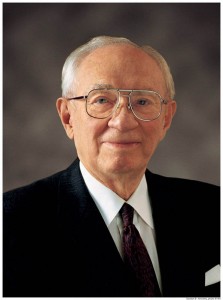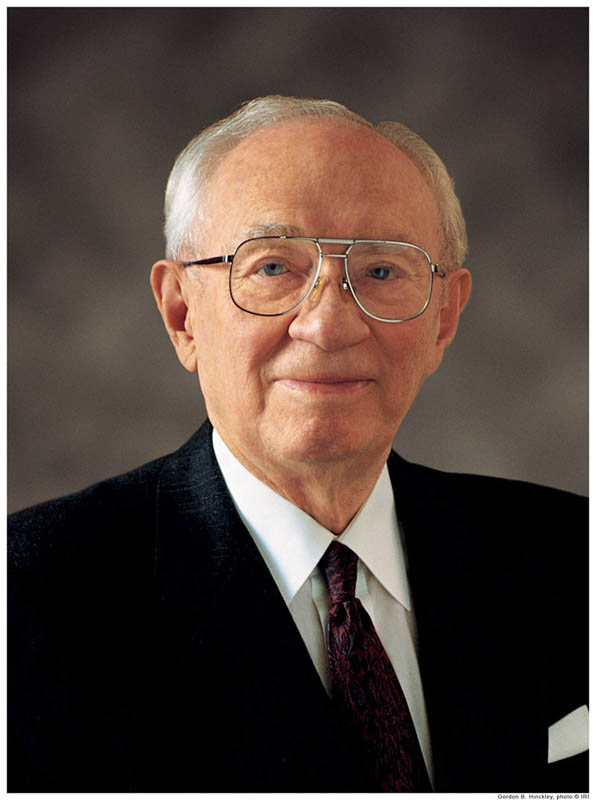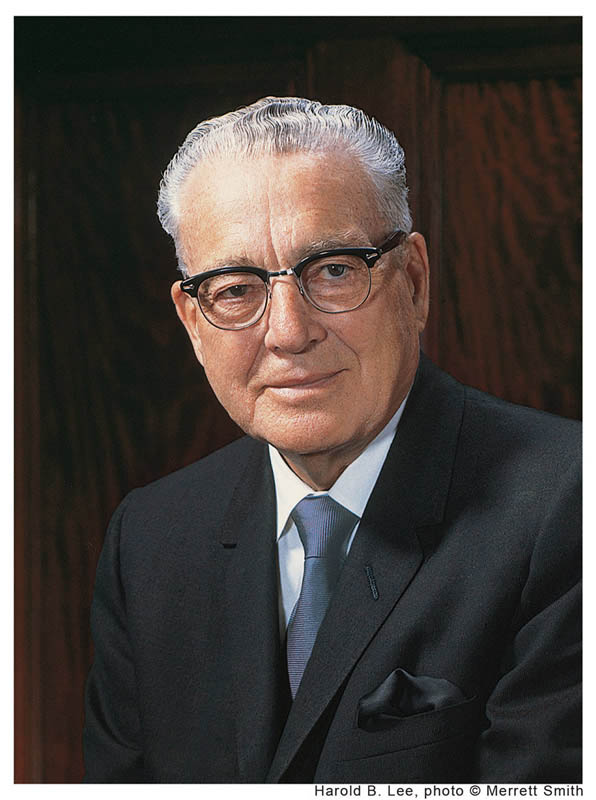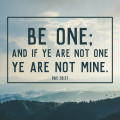Gordon B. Hinckley, the 15th called prophet of these modern times, wrote a poem several years ago that I just heard for the first time today. The words are so heartfelt, and because I’ve felt death so recently, it hit me particularly hard.
 What is this thing called death
What is this thing called death
This quiet passing in the night?
Tis not the end but genesis
of better worlds and greater light.
O God, touch Thou my aching heart
And calm my troubled, haunting fears.
Let hope and faith, transcendent, pure,
Give strength and peace beyond my tears.
There is no death, but only change,
With recompense for vict’ry won.
The gift of Him who loved all men,
The Son of God, the Holy One.
These gentle words of poetry spoken by a prophet of God pierced my soul. They brought remembrance of who I was before:
One of the most precious things given to us, I believe, is the knowledge of who we were before we came to this earth.
Elder Bruce R. McConkie, an apostle of our Lord Jesus Christ, tells us:
“Being subject to law, and having their agency, all the spirits of men, while yet in the Eternal Presence, developed aptitudes, talents, capacities, and abilities of every sort, kind and degree . . . As the ages rolled, no two spirits remained alike. Mozart became a musician; Einstein centered his interest in mathematics; Michelangelo turned his attention to painting. Cain was a liar, a schemer, a rebel who maintained a close affinity to Lucifer. Abraham and Moses and all of the prophets sought and obtained the talent for spirituality. Mary and Eve were two of the greatest of all the spirit daughters of the Father . . . and so it went through all the hosts of heaven, each individual developing talents and abilities as his soul desired.” (Bruce R. McConkie, The Mortal Messiah, Salt Lake City, Deseret Book 1979 1:23 497)
“Eternal Presence” is the presence of our Heavenly Father. We are His spirit sons and daughters, which gives me such a sense of completeness. I know who I am: — Read More — (Candace E. Salima, “Who Was I Before Life,” Mar 2008, Mormon Basic Beliefs, www.ldsblogs.com)
an acknowledgment that this brief moment of mortality is but a minute or so in the eternal scheme of our lives.
It is so difficult to part with loved ones as they return to our heavenly home. We concentrate on their absence in our lives, rather than their return to a glorious home . . . the home from whence we all came before mortality.
I mourned when President Gordon B. Hinckley died. But I also rejoiced that he had finally joined his sweet and beloved wife whom he missed so desperately.
I mourned when my father died. He was leaving behind a wife who loved and depended on him as well as twelve children, sons and daughters-in-law, grandchildren and great-grandchildren who miss him desperately. But he suffered so greatly at the end, it was a quiet, yet heart wrenching, relief when he left mortality and passed through the veil.
As my husband’s kidney transplant approaches I have had too much time to think of what could go wrong . . . because the transplant team is making sure we know everything that could go wrong so they don’t get sued if something does.
And yet the words of President Hinckley’s poem, particularly the second verse offer hope and strength:
O God, touch Thou my aching heart
And calm my troubled, haunting fears.
Let hope and faith, transcendent, pure,
Give strength and peace beyond my tears.
This peace spoken of is real and available to all who seek it. It was given to each of us, including my mother, when my father’s earthly time was growing to a close. The Holy Ghost whispered to each of us that Dad’s time was done and he had much to accomplish on the other side of the veil before the Second Coming of our Savior Jesus Christ. Through the grief, there came a piercing peace which filled our souls. Do we miss him, oh yeah . . . without question.
But President Hinckley reminds us that death:
Tis not the end but genesis
of better worlds and greater light.
That is what we must remember most . . . death should not be a time of mourning, just as life should not be a time of wasting this brief moment where we’ve been given the chance to become more like our Heavenly Father.
Weep for the separation, but not for the purpose. For death is merely the graduation from mortality to the next phase in our eternal existence. When resurrection time comes for each of us, we will move into yet another phase of eternity. Who we are and what we become, in other words, how high we wish to reach, is completely up to us.
Do we want to be as Jesus Christ? Then we must live as Jesus Christ.
Do we want to be as our Father in Heaven? Then we must obey His commandments, given to us by His Son, Jesus Christ.
Do we wish to grow and learn and reach the full measure of our creation? Then we must avail ourselves of the opportunities Jesus Christ has given us.
Did you catch the common theme? Jesus Christ. He is our salvation. In accepting Him, as our Lord, Savior and Redeemer, the Son of God, the God of all who have lived in this world, as the only path through which we might return to our Father in Heaven and back into the presence of Jesus Christ. Through Him, and only through Him, may exaltation be found.
So remember who we are, children of God. Remember the purpose of why we are. And remember where we are going. This knowledge has been restored through Joseph Smith, the Prophet of the Restoration. And the Gospel of Jesus Christ is contained, in its fullness, in the Book of Mormon, a second testament of Jesus Christ. The scriptures hold such precious truths which guide us through every aspect of our lives.
And this beloved prophet of God, President Hinckley tells us:
There is no death, but only change,
With recompense for vict’ry won.
The gift of Him who loved all men,
The Son of God, the Holy One.






